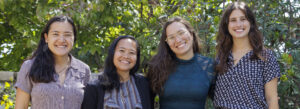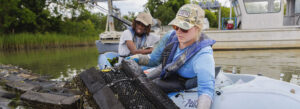Covi moves on to "greener pastures" after six years as VASG extension agent at ODU
After six years of boots-on-the-ground resilience efforts, Climate Adaptation & Resilience Assistant Professor of Practice Michelle Covi is leaving big shoes to fill at Old Dominion University. Covi relocated to Georgia to live and work on her family’s farm at the end of last year.
When Covi first arrived as an extension agent at ODU, the term “resilience” was still an emerging word in the Hampton Roads vocabulary. As the first Virginia Sea Grant extension agent at ODU, Covi set to work on applying her background in climate science to community engagement projects in Virginia.
“Michelle took on a brand-new position with plenty of ambiguity and set a solid foundation for her successor to continue to grow the program,” Virginia Sea Grant Director Troy Hartley said. “What she’s accomplished in community engagement on climate change has made a long-lasting, enduring impact on Virginia’s resilience.”
One of Covi’s major projects was the Resilience Adaptation Feasibility Tool (RAFT), which works with coastal communities to assess and improve their resilience. Covi was part of the RAFT core team led by the Institute for Engagement and Negotiation at the University of Virginia, the Virginia Coastal Policy Center (VCPC) at William & Mary Law School, and ODU.
“I am so thankful that I had the opportunity to work with and learn from Michelle these last few years,” said VCPC Assistant Director Angela King. “In the time we spent working together on the RAFT, one of the many things she taught me was the importance of understanding where the community is coming from so you can communicate your research in a way that is valuable to them.”
Covi also developed partnerships with city planners and architecture, engineering, and environmental firms through the Hampton Roads Adaptation Forum, a one-day conference for professionals to stay up-to-date on topics in resilience, hosted in partnership with the Hampton Roads Planning District Commission (HRPDC).
Ben McFarlane, senior regional planner for the HRPDC and co-organizer of the Forum, said Covi played a major role in brainstorming themes, finding speakers for the event, and coordinating logistics. Covi brought in both local and outside voices to discuss projects addressing sea level rise, from the Resilient Hampton initiative to the largest storm water pump in the world.
“Resilience was a new topic, and there hadn’t been a lot of familiarity with professionals in terms of awareness,” McFarlane said. “The Forum has brought that from research and academics to other professionals and helped spread new information, whether that’s to local government, construction, or designers and architects.”
“I’ve just met the best people that are doing really meaningful work in a lot of different areas and in different ways” Covi said.
“There was this big problem coming and nobody’s talking about it,” Covi said. “They were having flooding events already, and there was a lot of vulnerability. I just got drawn into it.”
Covi also helped organize a community engagement program called ASERT, the Action-Oriented Stakeholder Engagement for a Resilient Tomorrow. In Virginia Beach, Covi and a team from ODU used the ASERT framework to organize community events where Virginia Beach residents contributed to the City’s comprehensive sea level rise planning study.
Covi has also coordinated an oil spill workshop, which connected emergency responders, oil spill researchers, and representatives from the aquaculture and tourism industries to discuss response preparedness in the mid-Atlantic. She has also matched students to service learning projects in resilience, like helping a group of volunteer citizens set up an environmental stewardship award.
Covi became interested in addressing the science of sea level rise from a “human point of view” while working at East Carolina University’s Coastal Hazards Center on a project where she started discussions about sea level rise with small towns in North Carolina and South Carolina.
“You could see something was broken: There was this big problem coming and nobody’s talking about it,” Covi said. “They were having flooding events already, and there was a lot of vulnerability. I just got drawn into it.”
Covi said she has enjoyed collaborating with the researchers, government officials, community members, and resilience professionals during her six years at ODU.
“I’ve just met the best people that are doing really meaningful work in a lot of different areas, and in different ways—everyone from the citizen leaders who are focusing on their neighborhoods and trying to improve things for their neighbors, all the way to people working at the state and even national level,” Covi said.
Photos and video by Aileen Devlin | Virginia Sea Grant
Story by Madeleine Jepsen | Virginia Sea Grant
Published Jan. 20, 2020.
“One of the many things she taught me was the importance of understanding where the community is coming from so you can communicate your research in a way that is valuable to them,” King said.





